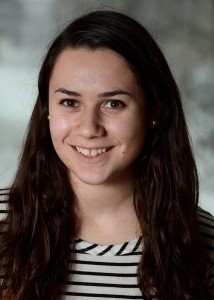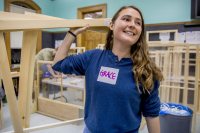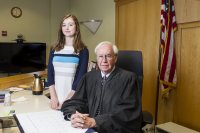
Senior thesis Q-and-A: The 1950s debate over Androscoggin River pollution
As a first-year student, I almost never use the phrase “senior thesis.”
Like all impending (and intimidating) tasks, senior thesis sits in my mind as a project that will never actually be mine to take on.
But when I met with Taryn O’Connell ’13 in the Bobcat Den, I found myself staring directly at the very thing that had appeared so theoretical and scary to me: a big, black three-ring binder.
Once I was able to catch my breath again after the initial shock, Taryn and I bonded over our mutual love of basketball. Taryn was a driving force on the Bates women’s basketball team all four years.
She recalled for me how strange it was to complete her final game as a college basketball player, and how the ending of her athletic career oddly paralleled her thesis experience.
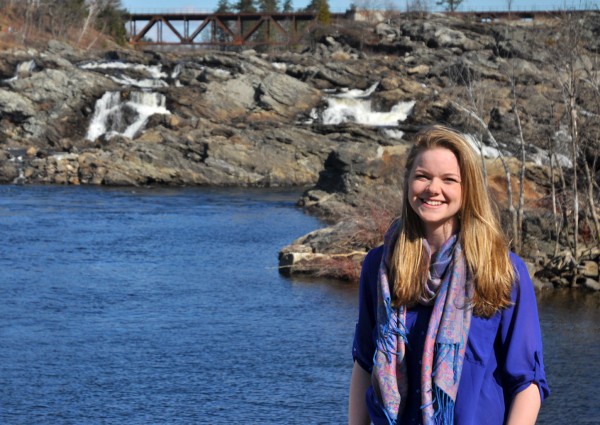
For her senior thesis in environmental studies, Taryn O’Connell ’13 investigated a debate about Androscoggin River pollution that took place in Lewiston in the 1950s. Photograph by Hank Schless ’13.
She researched a debate about Androscoggin River pollution that took place in Lewiston in the 1950s. Her thesis is titled “Place, Class and Culture: A Case Study of Pollution Debates in Lewiston, Maine, 1953-1955.”
I hear that seniors are told to practice their thesis elevator speech. What’s yours?
My thesis is about the pollution debate between a group called the Associated Industries of Maine, which was made up of the industry heads of the paper and textile companies, and a group called the Citizens for Conservation and Pollution Control.
I got statements from newspaper articles and used primary sources like interviews and pamphlets. I’m trying to see how these groups tried to expand their collective identity in Lewiston using place and class to reach different social classes in Lewiston.
What was the inspiration for your idea?
My junior year I took a class called “U.S. Environmental History” with Professor Joe Hall that really shaped my thesis.
I realized that everything is right here.
We did a project in the Muskie Archives and learned about Walter Lawrance, who was a Bates chemistry professor and the court-appointed “river master” for the Androscoggin.
There was a lot of information about the samples and testing they used to do, and I sat there and thought about how the river used to smell like rotten eggs. I realized that everything is right here. I wanted to learn about our community, and the thesis really pulled in my history buff side with my interest in social movements.
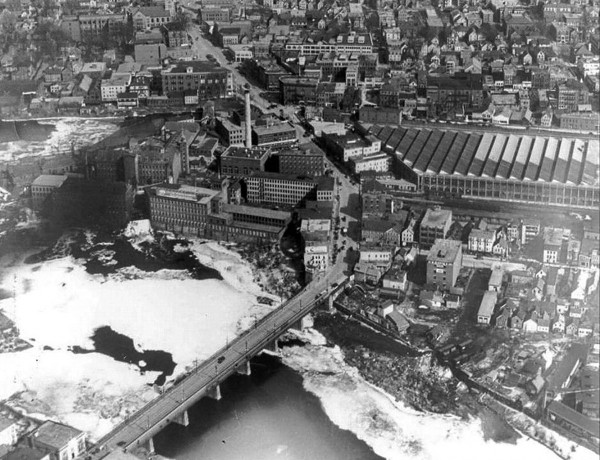
Along with foam and scum in the Androscoggin River, seen in this aerial photo of the Great Falls, circa 1930, was a strong smell. Photograph courtesy of the Androscoggin Historical Society.
Your go-to work space?
I like to do my work in the computer lab of Hedge.
Study-snack of choice?
Hmmm. Well, I don’t know if coffee counts as a snack because I drink that like it’s my job. But I’ll go with trail mix from Commons.
Any moments where you went “a-ha!”?
There were definitely moments where I understood exactly the arguments that the different groups were making. I was looking at the history of Lewiston in the early 1900s when the Catholic church didn’t let its members get involved in labor unions.
Click here to open a PDF file of O’Connell’s thesis.
I had a moment where I thought, “Oh it makes sense that if they’re not able to join labor unions, then they’re not going to fight for labor rights. And why would they be forthright in fighting against pollution if they feel it is going to compromise their jobs?” There were all of these traditions that the community kept with them over time.
How has your thesis experience changed your perception of our Bates community and our Lewiston community?
I think it has been huge to get off campus and do things like this. The more you take a step outside of our little box, the more you get to experience how rich in culture Lewiston really is. It has such an interesting past.
What is your relationship with your adviser like?
Sonja Pieck is great. She’s an assistant professor in environmental studies and also teaches in the Latin American studies program. She’s so helpful and always points me in the right direction. She’s definitely a professor that I respect a lot, and I’m really interested in the work she does with social movements.
What advice would you give me or to your freshman self?
I think I would say make sure to take advantage of what Lewiston has to offer. I wish freshman year I had done something right away to expose myself to that sooner. But I’m really lucky that I’ve been able to see so many different sides of the community through this experience.
What has been the most enjoyable part of working on your senior thesis?
I think my favorite part right now is just looking at it! Just getting it all on paper and putting the information together.
I’m looking at that book and thinking there’s no way I can pull it off.
You think, “I can’t do a thesis.” But everyone does. You just do it.
I’ll get back to you on that, Taryn.
